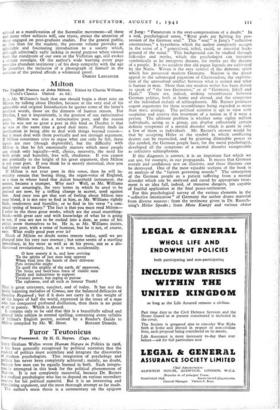Milton
Ir is Mr. Williams's fault that one should begin a short note on Milton by talking about Dryden, because at the very end. of his admirable and original Introduction he quotes some of the latter's loveliest words, those on the dimness of human reason. For Dryden, I say it impenitently, is the greatest of out ratiocinative poets. Milton was also a ratiocinative poet, and the reason why he was not so great a poet in this kind as Dryden is that he was at the same time a good deal more. . Poetry finds its justification in being able to deal with things beyond reason— but it must deal with them poetically and not through argument. If Milton sometimes tries to argue what can only be felt, these lapses are rare (though deplorable), but the difficulty with Milton is that he felt emotionally matters which most people can attack only logically—will, choice, necessity, the need for both pride and humility, free will, obedience. If you cannot rise poetically to the height of his great argument, then Milton is not your poet. If you think he is merely rhetorical, then you had better stick to Donne.
If Milton is not your poet in this sense, then he will in- evitably remain that boring thing, the organ-voice of England, or a man in whose hand that dulcet household instrument, the sonnet, became a trumpet. Why not? Well, as Mr. Williams points out amusingly, the very terms in which he used to be praised are now, by a trifling change in accent, used against him. And once you get that sort of feeling about Milton into your blood, it is not easy to find in him, as Mr. Williams rightly finds, tenderness and humility, or to find in his verse " a con- tinual spring of beauty." The fact is that you must read Milton— I refer to the three great works, which are the usual stumbling- block—with great care and with knowledge of what he is going to say, if you are not to be rocked into a daze, as some of his critics avow themselves to be. He is, as Mr. Williams insists, a delicate poet, with a sense of humour, but he is not, of course, easy. What really good poet ever is?
Much of Milton no doubt seems remote today, until we are plunged into his very rare essence ; but some seems of a startling immediacy, in his verse as well as in his prose, not as a dis- illusioned revolutionary, but, as it were, accidentally.
0 how comely it is, and how reviving
To the spirits of just men long opprest When God into the hands of their deliverer Puts invincible might To quell the mighty of the earth, th' oppressor, The brute and boist'rous force of violent men Hardy and industrious to support Tyrannic power, but raging to pursue The righteous, and all such as honour Truth!
That is great utterance, succinct, and of today. It has not the lovely haunting melodies of Comus, nor the balanced delicacies of Paradise Regained ; but if it does not carry in it the weight of all the hopes of half the world, expressed in the tones of a man who has conquered profound disillusion, then there is no point at all in poetry. Which is absurd.
It remains only to be said that this is a beautifully edited and printed little edition in normal spelling, containing every syllable of Milton's English poetry, assisted by a Reader's Guide to


























 Previous page
Previous page